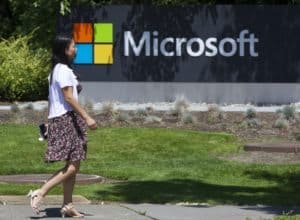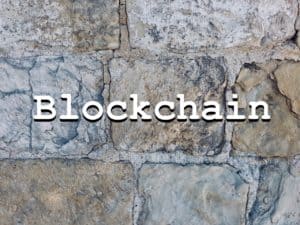 Microsoft Taiwan held a joint press conference with Digital China and HighCool companies at Le Meridien Hotel in Taipei June 28th to announce a “tripartite blockchain strategy cooperation” agreement has been struck between the three firms to create a vast, blockchain-moderated public-private computing cloud.
Microsoft Taiwan held a joint press conference with Digital China and HighCool companies at Le Meridien Hotel in Taipei June 28th to announce a “tripartite blockchain strategy cooperation” agreement has been struck between the three firms to create a vast, blockchain-moderated public-private computing cloud.
Also present at the conference were, “Taiwan’s blockchain venture pioneer Hu Day…” and Zhao Zhizhong, Head of Artificial Intelligence at Microsoft Greater China.
According to the corresponding press release, the three companies hope that by combining Microsoft’s Azure cloud-computing and commercial blockchain services with Digital China’s commercial blockchain services and HighCool’s expertise in cloud management, the resulting collaborative “super cloud” will one day be able to host the Internet of Things (IoT).
Microsoft Taiwan’s General Manager, Sun Jikang, claimed, “Microsoft Azure can enhance the security and computing speed of Digital China’s digital blockchain services.” He also noted the presence in Taiwan of, “first-class engineering and technical talents…whose innovative thinking cannot be underestimated,” and touted the island nation’s “solid manufacturing and R&D foundation” and “excellent geographical location.”
 He said the partnership would be governed by Microsoft Taiwan’s “Partner’s First” philosophy of cooperating, “to transform… upgrade and jointly develop cloud business and promote… (the selling of) cloud technology services to accelerate growth and profit.”
He said the partnership would be governed by Microsoft Taiwan’s “Partner’s First” philosophy of cooperating, “to transform… upgrade and jointly develop cloud business and promote… (the selling of) cloud technology services to accelerate growth and profit.”
Digital China is a large, Beijing-based IT firm with the stated mission of “building a ‘Digitalized China.’” It is a spin off of Lenovo, the world’s second largest manufacturer of personal computers. Lenovo has had a relationship with Microsoft since the late 90’s.
China Digital Co-Founder, Sun Kong Shan Tao, said he has been studying blockchain since 2014 and believes that, “blockchain technology needs to be combined with other technologies, such as the Internet of Things. (IoT), biometrics, and artificial intelligence (AI) (to) make a difference.”
General Manager Wu Jiefu of HighCool, reportedly stated, “On the day of the birth of the public cloud, we are committed to making…use (of) computing resources as eas(y) as (use of) water and electricity.”
The release states that he three companies see a rising “demand” for the fruits of their collaboration and also quotes conclusions from the International Data Corporation, which expects enterprise blockchain spending to double in 2018, from $945 million spent last year to $2.1 billion spent this year. “Banks, logistics, and manufacturing will be the main drivers, with the financial sector investing more than $754 million in blockchain solutions,” claims the Taiwanese release.
The Taiwanese announcement also claims that, currently, “the Microsoft Azure cloud computing platform covers 52 regions worldwide and can be used in 140 countries,” and states that the platform already has an extensive and working commercial blockchain apparatus within it, which includes, “high-performance and high-speed support.”
The Azure cloud blockchain is reportedly already being used by companies like Nestlé, “to…reduce costs and ensure product quality…(and) solve… dispute(s) that Nestlé may have with suppliers and customers due to products.”
A number of blockchain consultants in the west, however, including Jimmy Song and Johnny Dilley, have openly and persistently questioned whether enterprises really need full blockchains to solve their data security, storage and distribution problems.
The problem lies in inefficiencies wrought by true blockchains, where all data must be settled, by consensus, across all the computers in a network, rather than just one or a few computers in a single database.
Secure cryptographic consensus, they say, is energy-intensive, expensive and slow.
This method of data encryption is quite strong provided that the network is decentralized. But as soon as the network is governed by a central party, the “data sanctity” created by a blockchain network can be overcome.
Therefore, critics say, there is no need for an expensive and slow blockchain in private enterprise, and such businesses should rather be using simpler forms of public key cryptography.
Possibly, firms selling “blockchain technology” today are in fact are selling “distributed ledgers” (DLTs) but aren’t bothering to drop the trendy buzzword.
It is also possible that they are using smaller, trusted distributed encrypting networks rather than “trustless” autonomous networks. A small, consensus-encrypted network would, arguably, be more secure than mere password-protected data.
 While small firms already contracting out their data storage to trusted brands may be happy with their services, it behooves one, especially, “on the day of the birth of the public cloud,” to understand, as much as possible, exactly how one’s data is being store.
While small firms already contracting out their data storage to trusted brands may be happy with their services, it behooves one, especially, “on the day of the birth of the public cloud,” to understand, as much as possible, exactly how one’s data is being store.
Bitcoin explainer and former digital security consultant Andreas Antonopoulos has pointed out that IoT enthusiasts hope to connect people’s fridges and kitchens and home security systems and heating and cooling systems, not to mention civic and national infrastructure systems, to the Internet.
For the time being, Antonopoulos says, this simply means exponentially more personal systems vulnerable to hacks.

